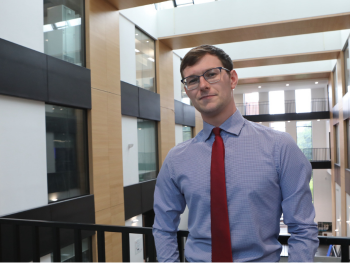University News Last updated 08 August 2024

Royal Birmingham Conservatoire (RBC) graduate Dylan McCaig has been recognised at the National Teacher Awards (NTA), achieving Silver in the Outstanding New Teacher of the Year category.
The Birmingham City University (BCU) alumnus studied a BMus (Hons) Degree in Organ Performance in 2020 and a PGCE with QTS in Secondary Music Education in 2022.
Dylan now teaches music at The Warriner School in Oxfordshire alongside his roles as Director of Music at St Mary’s Church in Banbury and Director of early music ensemble, Calder Consort.
The 26-year-old will find out if he’s won Gold at the NTA later this year. In the meantime, Dylan has shared his top tips for teachers who are going to start their journeys in September:
1. Your subject is your superpower
“Having a strong passion for your subject makes teaching a privilege, as your enthusiasm can inspire similar excitement in students, creating an engaging and enjoyable learning experience.
“By demonstrating a love for learning, you become a role model and encourage students to develop their own interests. Your enthusiasm also helps build stronger relationships, fostering respect and a positive classroom environment.”
2. You never stop learning
“Take advantage of CPD (Continuing Professional Development) opportunities or consider advanced qualifications like NPQs, to enhance your teaching skills and stay current with educational practices and technologies. Embrace new roles, such as mentoring, coordinating activities, or leading committees, to grow professionally and personally.”
3. Make your lessons engaging, fun and relatable
“Incorporate game-based learning, like quizzes and puzzles, to make challenging concepts more approachable and engaging. I used online platforms such as Kahoot, Blooket, Teaching Gadget and Dr Musik to enhance student engagement. Implement hands-on experiments, group projects and interactive demonstrations to encourage collaboration and practical application of knowledge.
“Organise field trips or invite guest speakers to provide real-world context. One of my favourite teaching moments was arranging my baroque orchestra (Calder Consort, an ensemble containing mostly RBC graduate musicians) to perform a session at the school I was training at, with the purpose of enriching students' understanding of the baroque period in relation to a GCSE Area of Study.”
4. Practice, practice, practice
“As a musician, I believe in regular practice and staying updated in my field to inspire my students. This dedication helps me maintain and enhance my skills, making me a better teacher, as students are more likely to engage when they see my passion for the subject.
“Collaborating with experts, including my mentor (Daniel Moult, Head of Organ at RBC) for Banbury Organ Day 2024, allows students to learn from distinguished professionals. Engaging continuously with your subject shows students that learning is a lifelong journey, requiring dedication and curiosity.
5. Let your students shine
“Provide opportunities for students to showcase their talents beyond the classroom through concerts, recitals, and talent shows. These events build confidence and pride in their work. Try to involve students in community events, such as performing at local festivals or nursing homes, to foster a sense of contribution and community.
“I set up Warriner Baroque (the UK’s only state school baroque ensemble) who went on to win the Maxwell and Hoods Trophy in the Rotary Club’s Banbury Young Musician of the Year in January. That was such a proud moment for myself, but also my students and the school.
“Promote interdisciplinary projects with other departments or organisations. An example is our school's collaboration with Banbury Choral Society and the RBC’s Percussion Department for a performance of Carl Orff’s Carmina Burana. Direct and support after-school clubs like bands, choirs, or orchestras and encourage your older or higher-attaining students to mentor younger peers through tutoring or leading ensembles.”
Want to find out more about clearing? Head to our Clearing webpage.